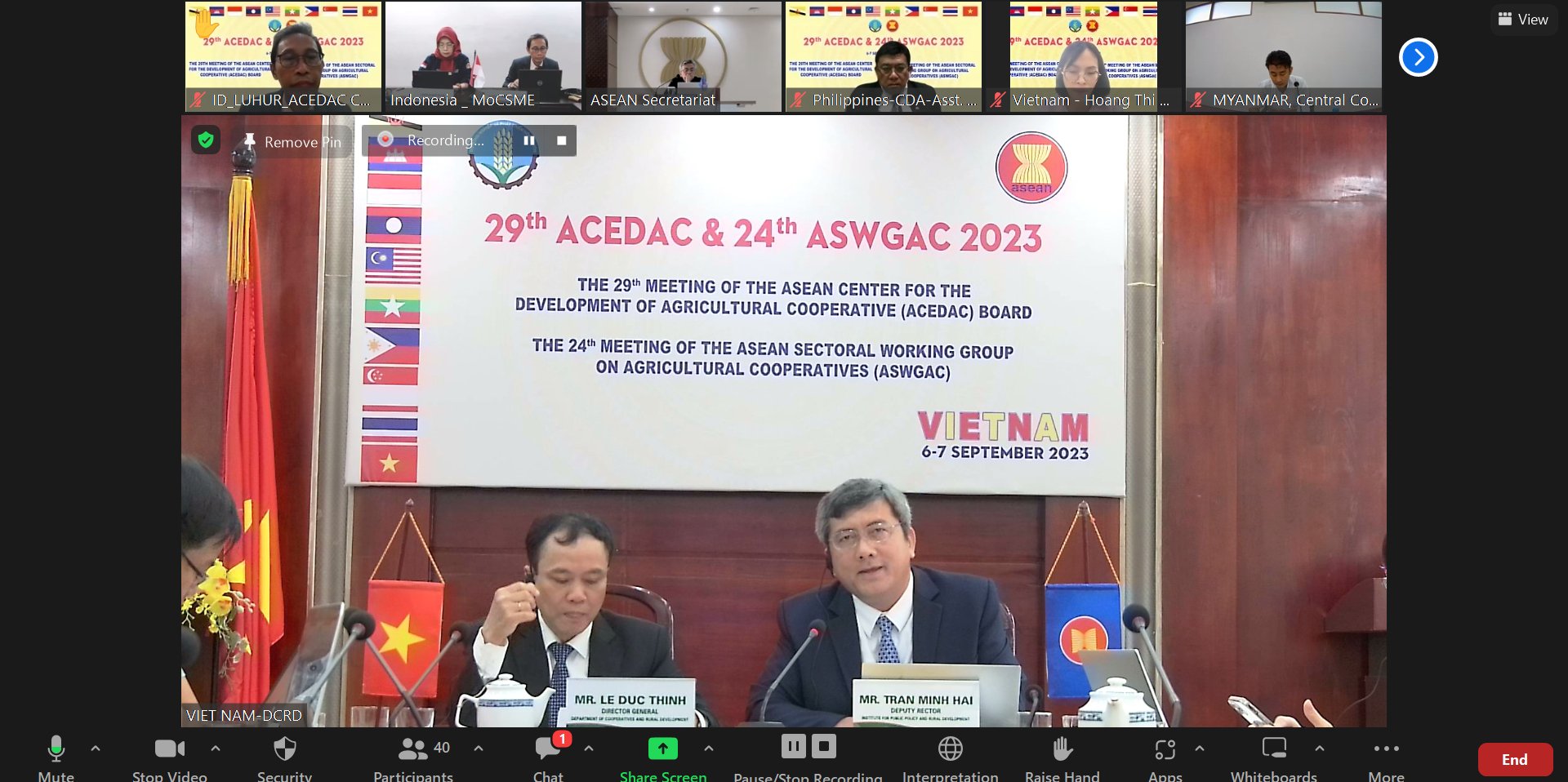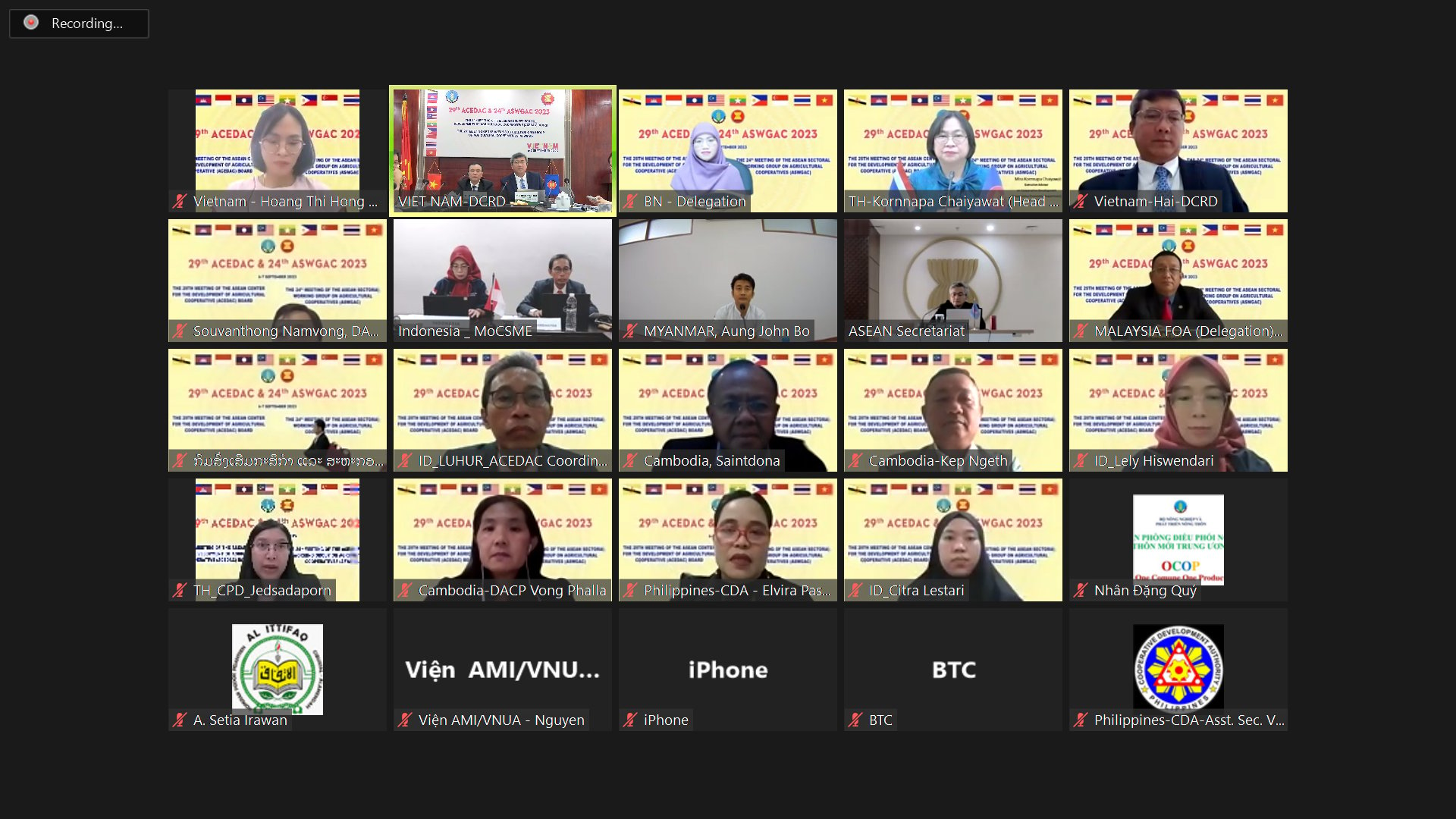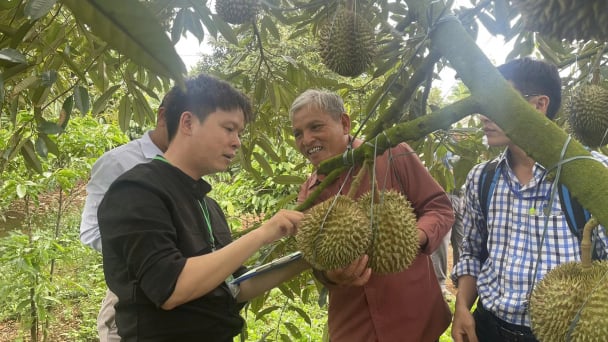June 1, 2025 | 11:56 GMT +7
June 1, 2025 | 11:56 GMT +7
Hotline: 0913.378.918
June 1, 2025 | 11:56 GMT +7
Hotline: 0913.378.918
On December 7, the Department of Economic Cooperation and Rural Development, (Ministry of Agriculture and Rural Development) assumed the role of chairing the 24th ASEAN Sectoral Working Group on Agricultural Cooperatives (ASWGAC) online meeting, in accordance with the rotation method.
The conference was co-chaired by Mr. Le Duc Thinh, Director of the Department of Economic Cooperation and Rural Development, and Mr. Tran Minh Hai, Vice Reckon of the Institute of Public Policy and Rural Development, both representatives of the Ministry of Agriculture and Rural Development.

Representatives of the Ministry of Agriculture and Rural Development, Mr. Le Duc Thinh - Director of the Department of Economic Cooperation and Rural Development, and Mr. Tran Minh Hai - Vice Rector of the School of Public Policy and Rural Development chaired the 29th meeting of ASEAN Agricultural Cooperative Development Center (ACEDAC) and 24th ASEAN Sectoral Working Group on Agricultural Cooperatives (ASWGAC) on September 6 and 7.
According to Mr. Tran Minh Hai, the ASEAN agricultural cooperative development working group has made efforts to facilitate coordination, collaboration, and assistance in activities pertaining to the growth of the Vietnamese cooperative network via various online platforms.
Mr. Hai added that the meeting includes the discussion of significant subjects and the gathering of ideas from the working group. It involves a review of past activities and ongoing tasks, as well as a discussion on plans and actions for the future.
The meeting included a wide range of subjects, including the progress of the implementation of the ASEAN cooperation policy framework in agricultural cooperatives. Member countries provided updates on the development of agricultural cooperatives, focusing on key aspects such as ASWGAC's main points, cooperative policies, and laws, national programs, the "One Commune One Product" (OCOP or OVOP) initiative, the application of digital technology in agricultural cooperative development, as well as challenges and recommendations for enhancing regional cooperation in the field of agricultural cooperatives.
According to Mr. Tran Minh Hai, on the Vietnamese side, the current number of cooperatives exceeds 29,000, with agricultural cooperatives comprising about 19,400 of them, or around 67% of the overall cooperative count in the nation.
Agricultural cooperatives have garnered over 3.4 million members, with households comprising 84% of the membership base, while the remainder of the members comprise people, groups, and enterprises. The average membership for agricultural cooperatives is 176 individuals, which represents around 31% of the total number of agricultural, forestry, and fisheries households in the country, amounting to 9.1 million households.
During the period of 2021-2025, Vietnam implemented many national programs aimed at enhancing the quality and operational efficiency of agricultural cooperatives.
Nevertheless, the establishment of agricultural cooperatives in Vietnam is confronted with several constraints, including limited scale, insufficient membership, inadequate managerial skills and qualifications, inadequate capital, technology, information on the market, and deficiencies in policy implementation.

Bridge points in Brunei, Cambodia, Indonesia, Laos, Malaysia, Myanmar, Philippines, Thailand and Vietnam attended the event.
In relation to the promotion of regional cooperation in this area, the representative from the Ministry of Agriculture and Rural Development has put forth a suggestion to enhance the exchange of information among member nations within the region. Additionally, there is a proposal to bolster regional-level initiatives that aim to foster the advancement of agricultural cooperatives. This can be achieved through the organization of study trips aimed at enhancing the capabilities of cooperatives within the region. Furthermore, it is recommended to establish exchange programs and facilitate the promotion of cooperative products among ASEAN members.
The focus of the meeting also encompassed the provision of feedback on the Strategic Action Plan for the period 2021 - 2025 by ASWGAC, the facilitation of information sharing among agricultural cooperatives in the ASEAN region, collaboration between ASEAN and its dialogue partners and international organizations, and other related matters.
The establishment of the ASEAN Agricultural Cooperative Development Center (ACEDAC) in 1984 was a direct outcome of the ASEAN Agriculture and Forestry Ministers' Conference. Its primary objective is to facilitate the collection, dissemination, and examination of data pertaining to the agricultural cooperative movement within ASEAN member nations.
Additionally, ACEDAC aims to foster the exchange of knowledge and best practices in formulating policies, initiatives, and schemes for the advancement of agricultural cooperatives among member countries. Furthermore, ACEDAC actively promotes and supports endeavors and undertakings related to agricultural cooperatives, while also facilitating networking, encouraging collaboration, and partnering with relevant stakeholders to implement regional projects focused on the development of agricultural cooperatives.
The establishment of the ASEAN Agricultural Cooperative Development Working Group (ASWGAC) was undertaken to facilitate the implementation of ACEDAC's initiatives. The ASWGAC is responsible for generating meeting summaries, technical reports, and action plans for future years during high-level meetings of ASEAN and the ASEAN Secretariat. Additionally, it actively encourages the development of agricultural cooperative networks, conferences, and events.
Translated by Dieu Linh

(VAN) Over the past five years, Quang Ninh Province has vigorously and synchronously implemented the ‘Say No to Plastic Waste’ campaign, yielding positive outcomes in advancing sustainable tourism.

(VAN) The prevention of plastic pollution necessitates collaboration among governments, businesses, and citizens. Today's little things contribute to a future free of plastic.

(VAN) This was the directive given by Deputy Minister Phung Duc Tien during a meeting with the Department of Livestock Production and Animal Health, and relevant stakeholders to prevent and control African swine fever.

(VAN) For the durian industry to succeed, the value chain must fulfill its commitments to the government, the community, and international partners.

(VAN) Vaccinating juvenile pangasius helps reduce disease, antibiotic use, and farming costs, increasing profits for export-oriented farmers in An Giang.

(VAN) Due to a limited supply of workforce and competitive recruitment requirements, businesses struggle to retain talented veterinary human resources.

(VAN) WOAH’s guidance aims to mitigate disease risks through a One Health approach that balances economic, conservation, and public health interests.